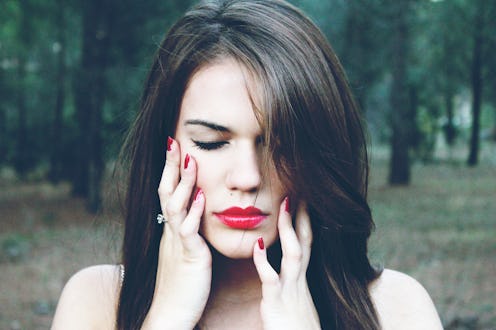Style
9 Signs Your Skin Is Aging Prematurely

Taking care of your skin is important not only to help it look good in the moment, but to protect it from aging as well. Some changes will inevitably happen over the years, but if you're worried that your skin worse than it should be, you should look out for signs that your skin is aging prematurely. There are a number of factors that can contribute to early aging, so spotting the signs early on can help you take the proper precautions to help you preserve your skin and keep it as youthful looking as possible.
"The number one factor responsible for premature aging is sun exposure," says dermatologist Dr. Arielle Kauvar over email. "Approximately 90 percent of the signs of aging (wrinkles, sagging, brown spots and botches, redness and visible capillaries, dry, dull skin) are due to lifelong sun exposure. Other factors include smoking, alcohol use, nutrition, exposure to extreme climates, poor health, and stress."
The earlier you start protecting your skin, the better it will age over time, and sometimes, seeing an expert is the best way to help you stop premature aging in its tracks. Here are nine signs your skin is aging prematurely and you should go see a dermatologist.
1Dull, Dry Skin
"As skin ages, it no longer exfoliates (sheds the dead cell layer) efficiently," says Kauvar. "As a result, dead cells build up on the skin surface and decrease luminosity and glow. It’s like having a thin callus on the skin surface."
2Brown Spots
One of the most obvious, telltale signs of aging is the appearance of brown spots. "Brown spots, age spots, sun spots or liver spots normally appear on exposed areas of skin and can be caused by too much sun exposure and the normal process of aging," says dermatologist Seth Forman, MD over email. "You can also partly blame it on genetics, stress, and vitamin deficiencies."
3Loss Of Volume Around The Face
"Many age-related changes take place in the bony structure of the face," says Kavaur. This can look like loss of volume around the face, including widening of the eye socket, shrinkage of the jaw bone, and loss and descent of fat compartments.
4Leathery Chest
Another sign of aging is leathery-appearing skin on the chest. "Your skin’s moisture and collagen deplete over time, but lifestyle choices, such as the time you’ve spent in the sun and the years you’ve been a smoker, accelerate the aging process," says Forman.
5Fine Lines & Wrinkles
Having some wrinkles is a natural, normal part of aging, but if you notice wrinkles appearing in a way that seems for extensive than your peers, you may be exhibiting signs of premature aging. "Most women will start to notice signs of aging on their faces at around the age of 40," says dermatologist Dr. Robin Evans over email. "If one has gotten a lot of sun exposure, those changes may be more visible in the early to mid 30s. Likewise if someone has been really careful to avoid sun exposure, those changes may be more visible later than 40."
6Thinning Of The Lips
Thinning lips are another telltale sign of aging. "The older you get, the less collagen you produce," says Forman. "It’s that simple." Want to keep your lips plump longer? Apply sunscreen or a lip balm with sunscreen, he suggests.
7Overly Veiny Hands
Hands often get more sun damage than your face, but most people don’t put the effort into protecting their hands as they do the rest of their body. "This constant UV exposure can damage the skin’s elastin, which leads to wrinkles, sagginess and the discoloration on your hands," says Forman. "As we get older, the delicate skin of the hands thins out, causing veins to appear more prominent."
8Deep Vertical Lines Around The Mouth
Deep vertical lines can appear around the mouth, and you can often see this when lipstick bleeds into those lines. "This may come from smoking cigarettes or sun damage, and it may also be genetic," says Evans. "The skin in this area may also thicken and develop a yellowish color."
9Broken Blood Vessels
Broken blood vessels on the face or spider veins are also signs of early aging. "These may develop from sun exposure, genetics, or excess alcohol intake," says Evans. "They may also be associated with the skin condition Rosacea."